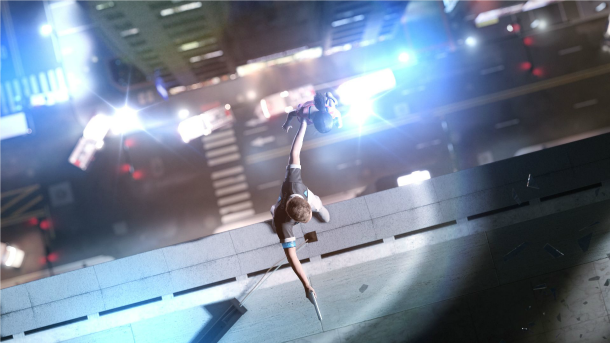Please support Game Informer. Print magazine subscriptions are less than $2 per issue
Detroit: Become Human

Back in 2012, Quantic Dream showed off an impressive tech demo that introduced us to Kara, a self-aware android being assembled in a factory who comes to terms with her own emotions and humanity. Detroit: Becomes Human builds on that initial concept, transforming it into a full-fledged game that takes place in a near-future world. We were treated to a brief trailer during Sony's press conference this week, and now we can expand on that based on our E3 demo of this PlayStation 4 exclusive.
In Detroit: Become Human, the androids look exactly like humans, aside from a circular mark on the sides of their heads. Androids have replaced humans in many job sectors, and help them with day-to-day tasks. However, some androids begin to show strange behavior, turning to extremes such as aggression and attempted suicides. This is an odd occurrence for the public to comprehend, because androids are meant to be emotionless.
Similar to Quantic Dream's past projects, Detroit: Become Human plays out like an interactive movie, where choice and consequence are carefully balanced. The game is narratively structured like Heavy Rain, where you play several sequences as different characters. If one dies, that characters stays dead. So far, we know two of these characters. The first is Kara, who originated from the 2012 tech demo. The second is Connor, an android working for the police who tracks down rogue androids that have become a danger to society.
In the demo, you play as Connor, a cool, calculated, and nearly emotionless android. He is sent to talk down another robot who has taken a young girl named Emma hostage on a roof of an apartment building. Entering her home, you see the mother being pulled away by the police, as she shouts in protest, "You sent one of them?! Why aren't you sending a real person?" However, Connor pays no attention to her, walking by with a neutral expression on his face as if the interaction never happened.
Because Connor is android, he has special abilities at his disposal to better investigate crimes. You can analyze information in real time, like glimpsing a photograph and identifying each person individually. Another one of these skills is being able to reconstruct scenes, which creates holographic outlines of past objects and people. For example, walking over to an open briefcase, you uncover that the deviant android had stolen the father's gun. By examining the corpse of the father in the living room, you will notice bullet wounds and pieces of glass sticking out of his torso. By having a closer look, you can recreate the scenario and see the android kill the father. Stepping into the Emma's room, you discover a video on a tablet that details the android's name.
It's possible to disregard all this exploration and immediately step outside to confront the android. However, through Connor's HUD, you'll see a percentage of your probability of success. It raises and lowers depending on your actions and the clues you find. It remains relatively low if you step outside without looking around. The passing of time is continuous, and the longer you take, different consequences occur.

Similar to past Quantic Dream titles, you have a limited amount of time to choose dialogue options. Clues and items you find can help unlock more dialogue. Choose wisely, because each choice helps persuade or dissuade the hostile android. Tension amps up as you walk onto the roof, and you can decide whether to tell him whether you're armed or unarmed. The android clutches onto the girl tightly at the edge. Approaching slowly is the best option, so that he doesn't panic and act rashly. You can choose to rationalize with him, demand that Emma be released, empathize by saying you're just like him, or reassure him. These choices accumulate towards different consequences. The SWAT team's helicopter hovers above, and with the press of a button, you can order it to fly away or keep its sights set on the target.
Depending on how you approach the situation, Emma will either be saved or she will fall to her death. Your mission will be displayed as failed or completed once the scene ends, though these black-and-white outcomes do not extend to all sequences.
Detroit: Become Human shows potential, but it remains incredibly similar in gameplay and mechanics to past Quantic Dream games. Connor's neutral persona makes him a bit of a flat character, but hopefully he will open up and come to terms with his bottled up emotions like other androids are capable of doing. As for Kara, I'm eager to continue her story, though it sounds like she is not necessarily the central character in this tale.











